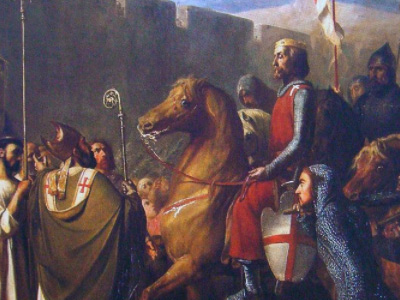First Crusade (1095–1099)
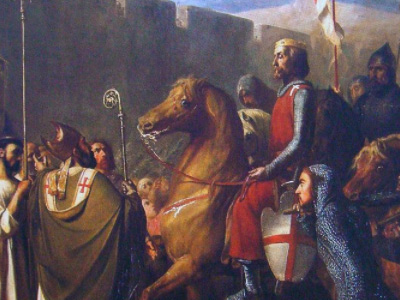
Aftermath and Legacy
The First Crusade succeeded in establishing the "crusader states" of Edessa, Antioch, Jerusalem, and Tripoli in Palestine and Syria (as well as allies along the Crusaders' route, such as the Armenian Kingdom of Cilicia).
However, there were many who had gone home before reaching Jerusalem, and many who had never left Europe at all. When the success of the crusade became known, these people were mocked and scorned by their families and threatened with excommunication by the Pope. Many crusaders who had remained with the crusade all the way to Jerusalem also went home; according to Fulcher of Chartres, there were only a few hundred knights left in the newfound kingdom in 1100. Godfrey himself only ruled for one year, dying in July 1100. He was succeeded by his brother, Baldwin of Edessa, the first person to take the title King of Jerusalem. Among the crusaders in the Crusade of 1101 were Stephen II, Count of Blois and Hugh of Vermandois, both of whom had returned home before reaching Jerusalem. This crusade was almost annihilated in Asia Minor by the Seljuqs, but the survivors helped to reinforce the kingdom upon their arrival in Jerusalem. In the following years, assistance was also provided by Italian merchants who established themselves in Syrian ports, and from the religious and military orders of the Knights Templar and the Knights Hospitaller, which were created during Baldwin I's reign.
Back at home in Western Europe, those who had survived to reach Jerusalem were treated as heroes. Robert of Flanders was nicknamed "Hierosolymitanus" thanks to his exploits. The life of Godfrey of Bouillon became legendary even within a few years of his death. In some cases, the political situation at home was greatly affected by crusader absences. For instance, while Robert Curthose was away on crusade the throne of England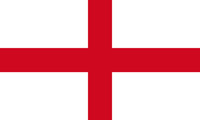 The Kingdom of England was a sovereign state on the island of Great Britain from about 927, when it emerged from various Anglo-Saxon kingdoms, until 1 May 1707, when it united with Scotland to form the Kingdom of Great Britain. The Viking invasions of the 9th century upset the balance of power between the English kingdoms, and native Anglo-Saxon life in general. The English lands were unified in the 10th century in a reconquest completed by King Æthelstan in 927. had passed to his brother Henry I of England instead, and their resultant conflict led to the Battle of Tinchebray in 1106.
The Kingdom of England was a sovereign state on the island of Great Britain from about 927, when it emerged from various Anglo-Saxon kingdoms, until 1 May 1707, when it united with Scotland to form the Kingdom of Great Britain. The Viking invasions of the 9th century upset the balance of power between the English kingdoms, and native Anglo-Saxon life in general. The English lands were unified in the 10th century in a reconquest completed by King Æthelstan in 927. had passed to his brother Henry I of England instead, and their resultant conflict led to the Battle of Tinchebray in 1106.
Meanwhile, the establishment of the crusader states in the east helped ease Seljuq pressure on the Byzantine Empire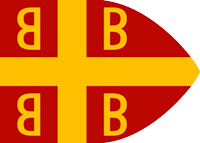 The Byzantine Empire, also referred to as the Eastern Roman Empire or Byzantium, was the continuation of the Roman Empire primarily in its eastern provinces during Late Antiquity and the Middle Ages, when its capital city was Constantinople. It survived the fragmentation and fall of the Western Roman Empire in the 5th century AD and continued to exist for an additional thousand years until the fall of Constantinople to the Ottoman Empire in 1453., which had regained some of its Anatolian territory with crusader help, and experienced a period of relative peace and prosperity in the 12th century. The effect on the Muslim dynasties of the east was gradual but important. In the wake of the death of Malik Shah I in 1092, political instability and the division of the Great Seljuq Empire prevented a coherent defence against the Latin states. Cooperation between them remained difficult for many decades, but from Egypt to Syria to Baghdad there were calls for the expulsion of the crusaders, culminating in the recapture of Jerusalem under Saladin later in the century when the Ayyubids had united the surrounding areas.
The Byzantine Empire, also referred to as the Eastern Roman Empire or Byzantium, was the continuation of the Roman Empire primarily in its eastern provinces during Late Antiquity and the Middle Ages, when its capital city was Constantinople. It survived the fragmentation and fall of the Western Roman Empire in the 5th century AD and continued to exist for an additional thousand years until the fall of Constantinople to the Ottoman Empire in 1453., which had regained some of its Anatolian territory with crusader help, and experienced a period of relative peace and prosperity in the 12th century. The effect on the Muslim dynasties of the east was gradual but important. In the wake of the death of Malik Shah I in 1092, political instability and the division of the Great Seljuq Empire prevented a coherent defence against the Latin states. Cooperation between them remained difficult for many decades, but from Egypt to Syria to Baghdad there were calls for the expulsion of the crusaders, culminating in the recapture of Jerusalem under Saladin later in the century when the Ayyubids had united the surrounding areas.
The success of the crusade inspired the literary imagination of poets in France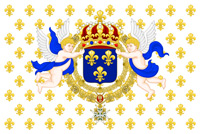 The Kingdom of France is the historiographical name or umbrella term given to various political entities of France in the medieval and early modern period. It was one of the most powerful states in Europe since the High Middle Ages. It was also an early colonial power, with possessions around the world. Colonial conflicts with Great Britain led to the loss of much of its North American holdings by 1763. The Kingdom of France adopted a written constitution in 1791, but the Kingdom was abolished a year later and replaced with the First French Republic., who, in the 12th century, began to compose various chansons de geste celebrating the exploits of Godfrey of Bouillon and other crusaders. Some of these, such as the Chanson d'Antioche, are semi-historical, while others are completely fanciful, describing battles with a dragon or connecting Godfrey's ancestors to the legend of the Knight of the Swan. Together, the chansons are known as the crusade cycle.
The Kingdom of France is the historiographical name or umbrella term given to various political entities of France in the medieval and early modern period. It was one of the most powerful states in Europe since the High Middle Ages. It was also an early colonial power, with possessions around the world. Colonial conflicts with Great Britain led to the loss of much of its North American holdings by 1763. The Kingdom of France adopted a written constitution in 1791, but the Kingdom was abolished a year later and replaced with the First French Republic., who, in the 12th century, began to compose various chansons de geste celebrating the exploits of Godfrey of Bouillon and other crusaders. Some of these, such as the Chanson d'Antioche, are semi-historical, while others are completely fanciful, describing battles with a dragon or connecting Godfrey's ancestors to the legend of the Knight of the Swan. Together, the chansons are known as the crusade cycle.
HISTORY
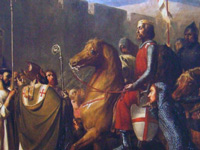
RESOURCES
This article uses material from the Wikipedia article "First Crusade (1095–1099)", which is released under the Creative Commons Attribution-Share-Alike License 3.0.
© Stories Preschool. All Rights Reserved.
